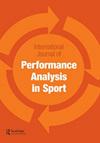精英冰场曲棍球的情境变量:比赛地点、球队水平、先发得分和中场休息时的比赛状态对比赛结果的影响
IF 1.6
4区 教育学
Q1 Health Professions
International Journal of Performance Analysis in Sport
Pub Date : 2021-09-08
DOI:10.1080/24748668.2021.1976057
引用次数: 3
摘要
摘要本研究的主要目的是建立一个简约模型,从不同的情境变量预测冰上曲棍球获胜的概率,并评估每个预测因子对比赛结果的贡献。对上赛季西甲联赛238场比赛的样本进行了分析。通过所有可能的回归方法选择匹配结果的最佳预测逻辑模型。整个模型包括五个分类预测变量(比赛地点、球队级别、对手级别、得分第一和中场休息时的比赛状态)和一个二元结果变量(比赛结果)。所选择的最终模型排除了评分优先的预测因子,并且对.413的临界点具有大于80%的敏感性和特异性。该模型用于预测通过两步聚类分析确定的32种常见情况下的比赛胜利。对比赛结果贡献最大的预测因素是中场休息时的比赛状态,其次是对手的级别、球队级别和比赛地点。我们的研究结果可能有助于溜冰场曲棍球教练和练习者认识到情境变量对比赛结果的贡献,从而调整他们的比赛计划,设计更具侵略性的游戏计划,提高对比赛的理解。本文章由计算机程序翻译,如有差异,请以英文原文为准。
Situational variables in elite rink hockey: effect of match location, team level, scoring first and match status at halftime on the competitive outcome
ABSTRACT The main purpose of the present study was to build a parsimonious model to predict the probability of winning in rink hockey from different situational variables and evaluate each predictor’s contribution to the match outcome. A sample of 238 matches played during the last season in the Spanish first division (OkLiga) was analysed. The best predictive logistic model for match outcome was selected through all possible regression methods. The entire model included five categorical predictor variables (match location, team level, opponent level, scoring first, and match status at halftime) and one binary outcome variable (match outcome). The final model selected excluded the scoring first predictor and had a sensitivity and specificity greater than 80% for a cut-off point of .413. This model was applied to predict winning a match in 32 frequent situations determined from a two-step cluster analysis. The predictor with the highest contribution to the match outcome was match status at halftime, followed by the opponent’s level, team level, and match location. Our findings may help rink hockey coaches and practitioners to recognise the contribution of situational variables on the match outcome to tailor their game plans and design more aggressive game plans, improving game understanding.
求助全文
通过发布文献求助,成功后即可免费获取论文全文。
去求助
来源期刊

International Journal of Performance Analysis in Sport
SPORT SCIENCES-
CiteScore
4.70
自引率
4.80%
发文量
38
审稿时长
>12 weeks
期刊介绍:
The International Journal of Performance Analysis in Sport aims to present current original research into sports performance. In so doing, the journal contributes to our general knowledge of sports performance making findings available to a wide audience of academics and practitioners.
 求助内容:
求助内容: 应助结果提醒方式:
应助结果提醒方式:


